|
|
|
Sort Order |
|
|
|
Items / Page
|
|
|
|
|
|
|
| Srl | Item |
| 1 |
ID:
148324
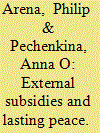

|
|
|
|
|
| Summary/Abstract |
Third parties are thought to face a trade-off in that those actions most likely to bring peace in the short run appear least likely to ensure its long-run stability. Yet the trade-off between conflict management and conflict resolution may be overstated. Analyzing an iterated three-player bargaining model with both information and commitment problems, we first demonstrate two conditions under which third parties may produce lasting peace through conditional subsidies, even without addressing underlying informational or commitment problems. Second, we illustrate this possibility by analyzing the impact of US foreign aid on patterns of conflict and peace between Israel and her neighbors. Our analysis indicates that the termination of the rivalry between Israel and Egypt was most likely not brought about by the Camp David accords or peacekeeping operations, but by sustained foreign aid provision. We discuss the implications for both this conflict and conflict management more broadly.
|
|
|
|
|
|
|
|
|
|
|
|
|
|
|
|
| 2 |
ID:
148323
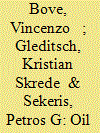

|
|
|
|
|
| Summary/Abstract |
We explore economic incentives for third parties to intervene in ongoing internal wars. We develop a three-party model of the decision to intervene in conflict that highlights the role of the economic benefits accruing from the intervention and the potential costs. We present novel empirical results on the role of oil in motivating third-party military intervention. We find that the likelihood of a third-party intervention increases when (a) the country at war has large reserves of oil, (b) the relative competition in the sector is limited, and (c) the potential intervener has a higher demand for oil.
|
|
|
|
|
|
|
|
|
|
|
|
|
|
|
|
| 3 |
ID:
148321
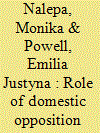

|
|
|
|
|
| Summary/Abstract |
This article considers how international criminal justice administered by the International Criminal Court (ICC) affects the possibility of negotiated, peaceful transitions of power in autocracies. We argue that a strong international criminal tribunal can deter dictators’ decisions to peacefully relinquish their power. It does so when the dictator in question has faced a relatively violent opposition, one that was ready to strike a deal with the dictator promising him amnesty in exchange for stepping down. Facing an opposition that “has skeletons in its closet,” the dictator will peacefully exit his office only under a weak ICC regime. We use a cross-national time-series data set spanning 1998 to 2007 to test our theory and find that under a weak ICC regime, the more skeletons the opposition has in its own closet, the more likely is the dictator to peacefully step down from office. Interestingly, this relationship holds, to a large extent, across various levels of dictator’s culpability. If the ICC is strong, the number of skeletons the opposition has in its closet has, for the most part, no effect on the dictator’s likelihood of stepping down.
|
|
|
|
|
|
|
|
|
|
|
|
|
|
|
|
| 4 |
ID:
148320
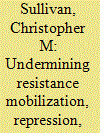

|
|
|
|
|
| Summary/Abstract |
This study examines attempts by authorities to undermine overt collective challenges, such as protests, riots, or armed attacks, by targeting activities that precede and/or support such behavior. After providing a theory of how repression and resistance develop, the study analyzes unique data drawn from the confidential records of the Guatemalan National Police to assess the use of repression during the years between 1975 and 1985. Empirical tests demonstrate that (1) government forces anticipate challenger development by identifying the mobilization activities nascent challengers rely on to initiate and sustain overt collective challenges and (2) the use of repression designed to undermine such efforts is specifically targeted against radical (i.e., highly transformative) claims making. Implications are drawn for how we understand and study political order and conflict.
|
|
|
|
|
|
|
|
|
|
|
|
|
|
|
|
| 5 |
ID:
148325
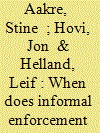

|
|
|
|
|
| Summary/Abstract |
We study experimentally how enforcement influences public goods provision when subjects face two free-rider options that roughly parallel the nonparticipation and noncompliance options available for countries in relation to multilateral environmental agreements (MEAs). Our results add to the MEA literature in two ways. First, they suggest that compliance enforcement will fail to enhance compliance in the absence of participation enforcement. Second, they indicate that compliance enforcement will boost compliance significantly in the presence of participation enforcement. Our results also add to the experimental literature on public goods provision, again in two ways. First, they reveal that previous experimental findings of enforcement boosting cooperation are valid only in settings with forced (or enforced) participation. Second, they show that subjects’ willingness to allocate costly punishment points is significantly stronger when the enforcement system permits punishment of both types of free riding than when it permits punishment of only one type.
|
|
|
|
|
|
|
|
|
|
|
|
|
|
|
|
|
|
|
|
|